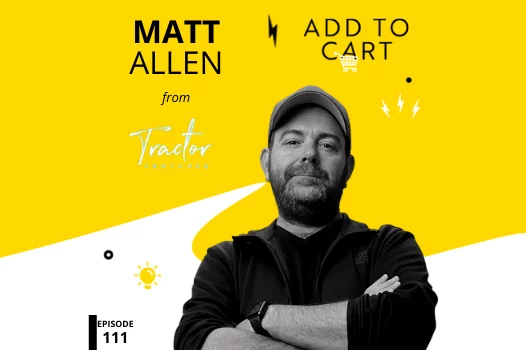In this episode of Add To Cart, we are joined by Matt Allen, CEO of Tractor Ventures. These guys offer revenue based finance, meaning that they can provide capital in return for payback (with interest) once you start generating the returns from the investment. This means founders don’t have to give away big chunks of equity to unlock growth. They’ve already got eCommerce leaders such as Kate Morris from Adore Beauty, Ed McManus from Deliveroo and Rob Ward from Quad Lock involved in the fund. In this ep we cover exactly how the Tractor Venture investment model works and the types of businesses it is most suited to. We also cover Matt’s observations around how male and female founded businesses differ, hear about the two Shopify apps that Tractor Ventures has backed and learn why Matt thinks moves like Afterpay’s acquisition will lead to non-linear growth for Australian innovation.
“Something I recommend
Matt Allenfor people looking for angel (investment) is seek out the people who understand your problem”
Questions answered in this episode include…
- At what stage do you recommend founders start looking for investment capital?
- What do you look for when investing in eCommerce startups?
- What have you learnt from the big names you’ve been involved with, like Kate Morris from Adore Beauty and Ed McManus from Deliveroo?
Beware the shiny things
“We talk about the cost of capital all the time. What will that cost you as a founder? It’s going to cost you now if you bring in some debt, or it’s going to cost you later if you sell some shares. So it’s a constant balance between, is this a short-term problem I’m solving that with enough capital it’ll just keep going? Or is it, I’ve actually hit a limit where I need to make an investment in processes, people, or technology so that I can actually get to the next level?
And every business is different, of course, but quite often I think that a lot of the challenge with founders sometimes they go a little wide instead of going narrow. Like if they’re not finished mining the thing they do before they start going too wide, then they start to get distracted”
If they’re anything like me, there’s always something shining around the corner. So I think people feel like they’ve got to their limit on a certain thing, but they haven’t. There’s always more customers out there and it’s always a challenge between the cost of acquiring those customers as you start to saturate stuff versus adjacencies.
But unless you’re a big scale, adjacencies can be the death of an early business, going too wide. Choice is not necessarily a good thing for your customers. So I’d prefer to see people have a small number of products and absolutely blanket the marketing rather than try and sell everything to everybody.”
Time to second purchase critical
“In reality, the capital for (e-commerce businesses) will probably be used for a couple of things. They’re maybe pulling forward some stock so they can get ahead of their growth curves and not run out. E-commerce being out of stock is a bad idea. People would just go somewhere else.
And the second one is using some of that capital to acquire customers. In e-commerce, as it is with any modern business, if you can really dial in your metrics and you know what your CAC is, and you know what LTV is, and you know how quickly it takes to pay back an acquisition, that’s the real-time you want to (invest). If you’ve got them dialed in, well, that’s the real time you want to use it.
So you can use finance because if I sell you $1 for $1.50, but you can make three bucks off it, then you’re ahead of the game. Right. And that’s really the mass that founders would want to be doing, and e-commerce is certainly in a high volume. E-commerce one is, it’s a cash flow business. How do you make sure you’ve got the right cash flow, got the right shape of capital, and for us because we actually do work with the teams after they borrow some money off us. You have the right people around you to help you support that growth.”
Know yourself
I do the ideas and initial execution, but I’m really not the best at refinement and systematization. So it took me 40 years to be comfortable knowing what I’m good at and then not disrespecting what I’m not good at. I actually have a total respect for it but just to acknowledge that I can’t do it and that if I do do it, it’s going to end in tears for everybody.
So now I just backfill my gaps with other people, and there’s a real element there on ego, right? To even start that conversation, you need to remind yourself that you are really shit at most things. I still struggle with asking people to do things I don’t like to do. I’m like, “Oh, that’s a shit job.” And they’re like, “What do you mean? I love that stuff.” I’m like, “Oh, sorry, I forgot you love that stuff. I hate that stuff.” And then we move on, right?”
Links from the episode:
Shopify Plus & JBHi Fi (sponsored)
Signet & Cheers Sweetie (sponsored)
This episode was brought to you by…





